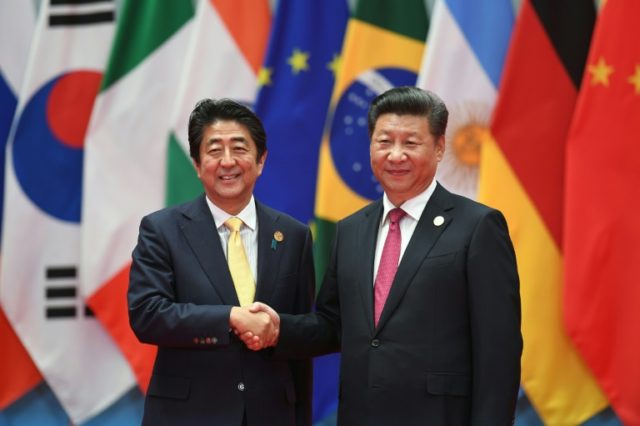Japan’s Prime Minister Shinzo Abe landed in Beijing, China, on Thursday, the first such visit by a Japanese head of government since 2011. Reports indicate that the two countries expect to sign dozens of memoranda of understanding, particular on trade, where China has worked to convince Japan to join its Belt and Road Initiative.
The initiative, also known as “One Belt, One Road” (OBOR), is nominally an attempt to recreate the Ancient Silk Road, connecting trade routes from Beijing to Western Europe, both on land and sea. In practice, China has used the initiative to lure developing nations into predatory loans with high interests rates, triggering economic crises and forcing some nations to hand over control of some of their sovereign territory to the Chinese. In Africa, opponents of the deal cite reports of colonialist “apartheid” practices, segregating local African workers from imported Chinese supervisors and abusing their labor.
China has long hoped to entice Japan into Belt and Road projects given Tokyo’s sturdy economy. In attempting to deepen economic ties, however, the two countries face significant historical disagreements, from World War II disputes to China’s invasion of Japanese territory in the East China Sea.
On Thursday, however, Abe made little mention of these disagreements, instead thanking his hosts for their hospitality upon arriving.
“Japan and China share a big responsibility for regional and world prosperity. Based on that recognition, I would like to hold candid talks with President Xi Jinping and Premier Li Keqiang over a variety of global issues,” Abe said before boarding his flight in Tokyo, according to Japan’s Kyodo News. Of the East China Sea, Abe said he hopes to make it “a sea of peace, cooperation, and friendship.”
The Chinese Foreign Ministry told reporters on Thursday that Abe’s first engagement will be a meeting with Premier Li Keqiang and a visit to “a photo exhibition on China-Japan economic and trade cooperation achievements.” The two will also attend a ceremony celebrating the 40th anniversary of the Treaty of Peace and Friendship, which binds the two countries to avoid seeking hegemony or expansionism against each other.
Abe is expected to meet with Communist Party leader Xi Jinping on Friday and attend a state banquet in his honor. His visit will last three days.
At the reception with Li, Abe once again praised the bilateral relationship. “Japan and China play an irreplaceable role in the economic development of Asia and even the world,” he said, according to Chinese media. Abe added the two had a responsibility to “promote peace and prosperity.”
Li suggested a larger role for Japan in OBOR in his remarks. “China welcomes Japan to take part in the ‘Belt and Road Initiative’,” he reportedly said. “China and Japan have to stick to the path of peace, friendship and cooperation to build a more mature and consolidated China-Japan relationship.”
Reuters reports that Abe and Xi are expected to sign “around 50 project memorandums of understanding,” ranging from trade issues to energy projects. The South China Morning Post identified at least 30 of the joint projects to be related to infrastructure.
China’s state media outlets appeared initially pleased by the visit. In an article published Thursday, the state-run Global Times called the visit “a landmark event that signals China-Japan relations are returning to the right track.” The newspaper goes as far as to suggest that Chinese people should stop “imagining that Japan may become a major nuclear power and will invade China again,” instead suggesting, once again, greater trade ties. The story also hints at the potential for China and Japan to unite against anti-China sentiment in the West, fueled by China’s incessant campaign to invade and colonize the South China Sea, its intellectual property theft, and the Communist Party’s flagrant disregard for human rights.
“The geopolitical locations of China and Japan have constantly led to tragedies in history. But in the current era of globalization, their geographic closeness and cultural similarities should brew conditions for cooperation,” the Times notes.
Chinese Foreign Ministry spokeswoman Hua Chunying made a similar remark in previewing Abe’s visit on Wednesday.
“Presently, the world is challenged by unilateralism and the international rules and multilateral order are severely impacted. … China and Japan shoulder important responsibility in opposing all forms of protectionism and unilateralism and upholding multilateralism and free trade,” Hua said. “The two countries are duty-bound to strengthen communication and cooperation, jointly safeguard international rules and order and contribute to promoting world peace and development.”
Japan is one of the United States’ closest allies, and Abe personally enjoys a close relationship with U.S. President Donald Trump. Abe was the first world leader to visit President Trump after his electoral victory in 2016.

COMMENTS
Please let us know if you're having issues with commenting.